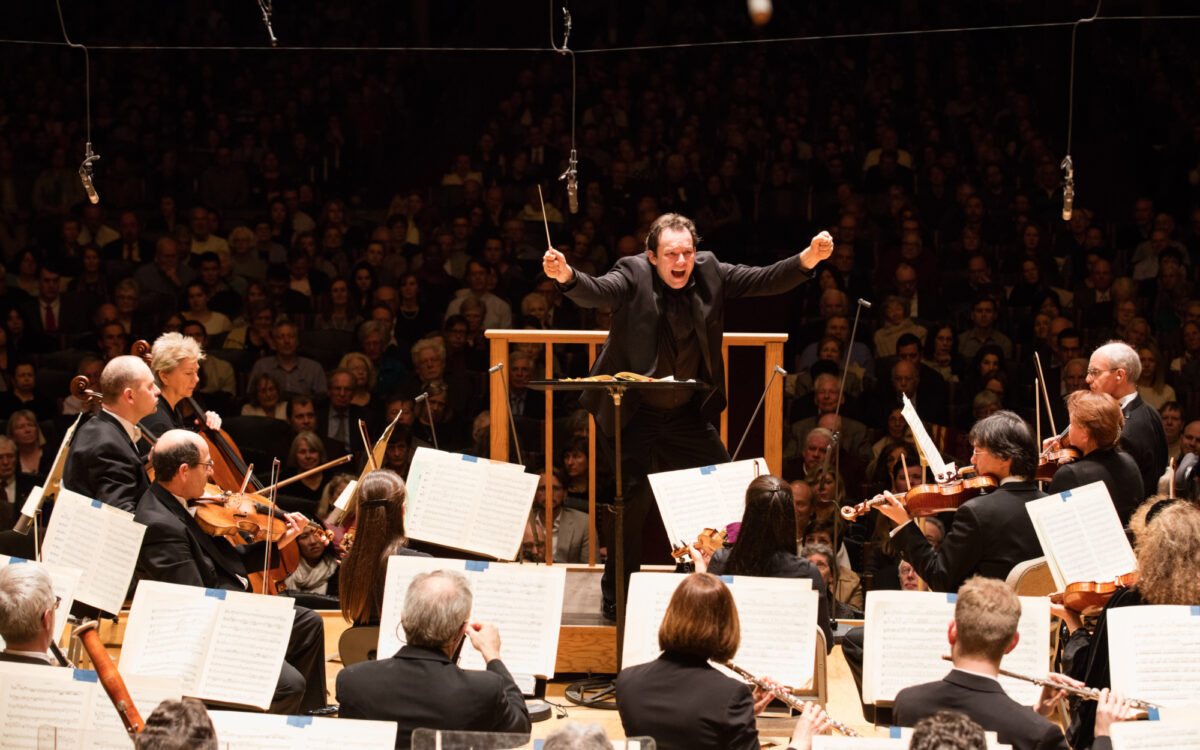Till Eulenspiegel's Merry Pranks
Quick Facts
- Composer’s life: Born June 11, 1864, in Munich, Germany; died September 8, 1949, in Garmisch-Partenkirchen, Bavaria, Germany
- Year completed: 1895
- First performance: November 5, 1895, Franz Wüllner conducting, in Cologne, Germany
- First BSO performance: February 22, 1896, Emil Paur conducting
- Approximate duration: 15 minutes
The score of Till Eulenspiegel calls for piccolo, 3 flutes, 3 oboes and English horn, 2 clarinets, clarinet in D, bass clarinet, 2 bassoons and contrabassoon, 4 horns plus 4 more ad lib., 3 trumpets plus 3 more ad lib., 3 trombones, bass tuba, timpani, snare drum, bass drum, cymbals, triangle, large rattle, and strings (first and second violins, violas, cellos, and double basses).
Richard Strauss’s greatest musical legacy of the late 19th century was his seven tone poems, which were composed in two groups of three and four:
- Macbeth (1888), Don Juan (1889), Death and Transfiguration (1889)
- Till Eulenspiegel (1895), Also sprach Zarathustra (1896), Don Quixote (1897), A Hero’s Life (1898)
The major event separating these two symphonic sets was Strauss’s first attempt at opera, Guntram (1893). It premiered in Weimar to a lukewarm reception, but the more important Munich first performance was an outright failure, and, despite promises to the contrary, there were no repeat performances. Strauss was angry, so much so that he planned to write a scornful opera about an anti-hero (himself) taking on the provincial, narrow-minded citizens of Schilda, a thinly disguised Munich. The title was Till Eulenspiegel and the Citizens of Schilda (Till Eulenspiegel bei den Schildbürgern). In mythical Schilda, a medieval town populated by empty-headed philistines, the hapless burgers sentence Till to death, then ultimately make him their mayor.
Strauss dropped the Till opera project and decided to transfer his disdain to a tone poem, whose program we know firsthand from notes the composer wrote into the score of a friend:
Bar 1: Once upon a time there was a knavish fool / Bar 7—named Till Eulenspiegel. / 5 bars before 3: He was a wicked goblin / 6 bars before 6: —up to new tricks.
And so on. Till hops on horseback and rides through the market, disguises himself as a minister mocking religion, flirts with women, poses as an academician engaging in scholarly double-talk, and by the end of the work finds himself on trial and sentenced to death by hanging.
Unlike the earlier tone poems, Till Eulenspiegel lacks the designation “tone poem” as a subtitle; instead it suggests a specific form: Till Eulenspiegel’s Merry Pranks, after the Old Rogue’s Tale, set in Rondeau Form for Large Orchestra. One contemporary music critic suggested that Strauss’s first prank may well have been the use of the term “rondeau” in the subtitle, for Till’s only apparent connection with the old French forme fixe is the composer’s choice of spelling. Strauss followed with an explanation of his rondo form, saying that it was “an expansion of rondo form through poetic content.” Given the episodic nature of the work as well as the libertine qualities of its protagonist, a rondo treatment seems appropriate. But, as in Don Juan, it is hardly conventional: the sense of rondo (“return”) is achieved mostly by the return of Till’s themes to articulate his various adventures. In fact, Till Euelenspiegel might just as easily be heard as a kind of a ritornello structure [a form used by Vivaldi and Bach in the Baroque concerto—Ed.].
Till Eulenspiegel premiered, with great success, in October 1895, under the baton of Franz Wüllner in Cologne. It is Strauss’s most compact tone poem and, arguably, the most performed. Despite all the humor and satire, all handled with remarkable lightheartedness, Till Eulenspiegel is score for a larger ensemble than any of the previous tone poems. Strauss had learned a lot about orchestral detail and color during the years since Death and Transfiguration, evinced by the use of the ratchet when Till comes riding through the market, the piercing D clarinet when he whistles in the face of death on the gallows, and the like. After completing Till, Strauss even thought, once again, of composing a Till opera, but instead turned his attention to Also sprach Zarathustra (1896). A new stage work did not emerge until 1901, with the composition of Feuersnot—the story of a magician who casts a spell on the indolent, narrow-minded citizens of medieval Munich.
Bryan Gilliam
Professor Emeritus of Music at Duke University, Bryan Gilliam is a scholar of 19th- and 20th-century German music. He is the author of The life of Richard Strauss in the Cambridge Musical Lives series as well as editor of several volumes of Strauss scholarship. His most recent book is Rounding Wagner’s Mountain: Richard Strauss and Modern German Opera.


